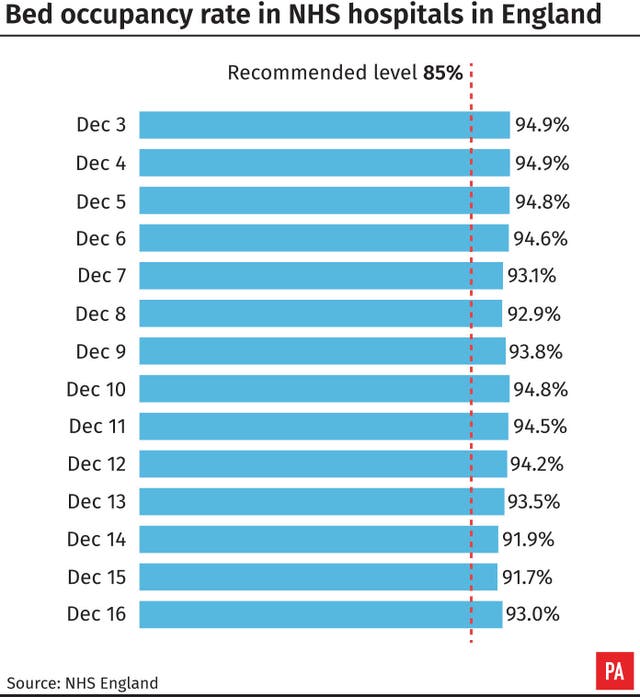
NHS performance in key areas improved last week, but health experts warned the figures show there is nevertheless a “massive stress on the system” as the festive season approaches.
Ambulance handover delays, bed occupancy and long stays were all down week on week, according to NHS England as it released its weekly data.

But Dr Nick Scriven, president of the Society for Acute Medicine, warned the figures “don’t show the whole picture,” with bed occupancy in hospitals remaining at dangerous levels.
A bed occupancy rate of 85% is recommended to maintain patient safety standards, but the percentage was far higher than that in the week ending December 16.
The NHS is facing ‘a perfect storm’ winter crisis, as ministers’ energies are diverted by Brexit, Unite, Britain and Ireland’s largest union, warned today (Thursday 20 December).https://t.co/fyHyxqZHIu
— Unite the union (@unitetheunion) December 20, 2018
Meanwhile, the union Unite warned the NHS is facing a “perfect storm” this winter, as ministers’ energies are dominated by Brexit.
Unite, which has 100,000 members in the health service, said a diverse range of issues – including funding and staff shortages – were affecting the NHS, with problems likely to come to a head during the busy winter period.
Dr Scriven said: “As we approach the holiday season the pressure on the frontline of healthcare is ever-increasing.
“Additionally, these figures don’t show the whole picture as they are ‘massaged’ by including specialist centres, such as children only, which always run at 70%.”
Here is part of #SAM view:Performance amongst the worst on record, emergency admissions and cancelled operations both up. We are going into winter in the same state as last year high bed occupancy, > 15,000 patients in hospital >21 days, extra beds open- a significant problem https://t.co/3HnLy2Ly3W
— Nick Scriven (@nickscr1) December 13, 2018
Dr Scriven said the good news was that so far there is no indication of a more than usual amount of influenza or norovirus being contracted.
The figures show that 13 trusts with Type 1 A&Es (10% of the total) implemented one or more temporary ambulance diverts – where ambulances with patients in are sent to other hospitals – with 30 taking place in total.
More than 96,000 people were taken by ambulance to A&E, of which 86,900 (90.3%) were transferred to the care of A&E staff within 30 minutes, higher than the previous week.
An NHS spokesman said: “NHS performance in key areas has improved this week, which is a testament to the hard work of the service’s staff, in and out of hospitals, across the country.
“That includes GPs and their teams delivering evening and weekend appointments in every part of the country, doctors and nurses providing expert advice through NHS 111, and ambulance and A&E staff standing ready to deal with emergencies.
“Hospital bed occupancy fell compared to the week before, and was also lower than the same week a year ago. The proportion of NHS staff who have had the flu vaccination is also up on last year, which was itself a record high.
“But since the festive period is often a challenging time for the NHS, the public can help us help them stay well.
“Keeping homes warm helps and, as the British Heart Foundation have said today, it’s vital that those who are eligible and haven’t yet got their free NHS flu jab do so now.”
A&E departments are under enormous pressure, particularly during the winter months. For health issues that are not an emergency, you can call NHS 111 or visit your local pharmacist for fast, convenient help: https://t.co/qFyOHNz1iv #HelpUsHelpYou #StayWellThisWinter pic.twitter.com/Wyk0fC1BZE
— RCPCH (@RCPCHtweets) December 19, 2018
Unite cited a number of areas of concern, including a 12% drop in the number of mental health nurses between May 2010 and August this year and a lack of progress in the integration of health and social care as the elderly population continues to grow.
Unite national officer for health Colenzo Jarrett-Thorpe said: “The NHS is facing a perfect storm this winter as ministers’ energies are subsumed by Brexit.
“The £20 billion a year injection of extra cash for the NHS by 2023-24 announced by the Government in the summer is simply not going to be enough to cope with rising demand as the population increases.
“It works out at 3% a year when historically, since the NHS was founded in 1948, the average has been 4% – the shortfall in funding is glaring.
“Every year the NHS faces a difficult period during the winter, but this time we are facing a perfect storm as a diverse range of issues come home to roost.
“It is time that Health Secretary Matt Hancock and his ministerial team refocus their energies on tackling the crisis engulfing the beleaguered NHS, rather than simply, once again, kicking the can down the road, which seems to be the maxim for this Government.”


Comments: Our rules
We want our comments to be a lively and valuable part of our community - a place where readers can debate and engage with the most important local issues. The ability to comment on our stories is a privilege, not a right, however, and that privilege may be withdrawn if it is abused or misused.
Please report any comments that break our rules.
Read the rules here